Sometimes wild birds can disturb, harm or eat your chicken’s feed. So keeping wild birds out of chicken coop is very important. Generally scratch grains, chicken feed, fresh water etc. are attractive enticements to the wild and neighboring birds.
Because in the wild, those birds always search for foods and if they find any chances they will definitely use the opportunity. But you have to be careful about those birds because this types of wild and neighboring birds can bring avian diseases into your farm and may fight with your chickens.
Also, there are many wild birds which are very dangerous and can take your chicks as a tasty meal. Some birds may steal eggs from your coop.
So, it is very important to learn how to keep wild birds out of chicken coop and secure your flock from them. Here we are describing the common ways of keeping wild birds out of chicken coop.
Why Keeping Wild Birds Out of Chicken Coop?
Keeping a backyard flock of chickens brings numerous benefits, from fresh eggs to a sustainable food source. However, one challenge that poultry owners often face is the presence of wild birds in the chicken coop.
Wild birds can pose several problems, including the spread of diseases, stealing feed, and causing stress to the chickens. Now, we are going to explore various strategies and preventive measures to keep wild birds out of your chicken coop, ensuring the health and well-being of your feathered friends.
Understand the Risks Associated with Wild Birds
Wild birds, such as sparrows, starlings, and pigeons, can introduce diseases to your flock, including avian influenza, salmonella, and respiratory infections. Additionally, their presence can lead to increased stress among the chickens, resulting in decreased egg production and overall poor health.
Identify the Problem
Identify the main problems that the wild birds are causing before making better protection for your chickens. Try to observe the types of the wild birds. Are they tiny or large sized? Observe the activities of both of your chickens and wild birds before constructing a bird-proof chicken coop.

You have to handle birds of prey, they are very dangerous and love to eat chickens. Doves or sparrows are another types of wild birds who enjoy eating your chicken’s feed. For keeping all types of wild birds out of your chicken coop take suitable species-tailored approach.
Feeding Birds
Chicken’s feed is very attractive for some wild birds. As a result, the feed will attract various types of wild birds to the coop. Never provide extra feeds than your chicken’s need and make sure not to leave large amounts of excess feed in the coop.
You can stop wild birds from coming into the coop for a meal by feeding smaller amounts of leftovers or vegetables. You can also feed your chickens in a specially designed feeder that requires them to actually operate it to access the feed.
If you want, you can feed the wild birds by keeping their feeders away from your chicken coop. They will enjoy the food without having to enter the coop. Observe your chicken coops for signs of building nest by the wild birds.
If the wild birds make any nest then take it apart and destroy it. Doing this will discourage nesting behavior and finally your chickens will be safe.
Birds of Prey
Birds of prey are very dangerous and generally they want to eat your cute chicks or chickens. Common and dangerous birds of prey for chickens are falcons and hawks. Crows are also one type of birds of prey.
Personally I have seen them eating chicks but they can’t harm the adults. Completely block the access of birds of prey for stopping their entrance inside the chicken coop.
You can use wood to block openings of your coops if there any. And you must have to reinforce the wire sides of the coop and ensure it is 100 percent enclosed.
Always lock the main door except feeding, watering, caring or egg collecting time. Allowing your chickens the freedom to enter and exit the coop as they desire is important. But it is more important to keep them safe.
Coop Construction
Make your chicken coop in such a way that it can prevent all types of wild birds. For stopping small birds coming inside your coops, first watch their movements very carefully and then add additional roofing or screens to the coop as needed.
A solidly constructed chicken coop can help you keeping all types of wild birds outside the coop. You can use drape netting over the coop if small birds try enter the coop through the holes in the wire fencing or windows.
And cover all entry points with netting and fasten it down to secure it. Setup such a covering or door that your chickens can push and open easily but smaller birds can’t do it and find difficult to move. Make this system only if your chickens have access to the outdoors through a door.
Create a Secure and Predator-Proof Chicken Coop
Building a secure and predator-proof chicken coop is the first line of defense against wild birds. Ensure that your coop is made of sturdy materials, with no gaps or holes that birds can enter through.
Install secure latches on doors and windows to prevent unwanted entry. Consider using hardware cloth instead of chicken wire, as it provides better protection against smaller birds.
Install an Appropriate Roof
Choose a roof for your chicken coop that discourages birds from perching. A slanted or sloping roof design prevents birds from finding comfortable perching spots and helps discourage their presence. Alternatively, you can use bird spikes or netting on the roof to make it inaccessible to wild birds.
Eliminate Food Sources
Wild birds are attracted to the feed and water sources in your chicken coop. To discourage their presence, ensure that all feed is stored securely in rodent-proof containers.
Avoid overfilling feeders and clean up any spilled feed promptly. Consider using automatic feeders that dispense food at specific times to minimize the exposure of feed to wild birds.
Restrict Access to Water
Wild birds need water sources, and they may be drawn to your chicken’s water supply. To prevent this, use poultry-specific waterers that are difficult for birds to access.
Hanging waterers or nipple waterers are effective options that minimize the risk of contamination and discourage wild birds from gathering.
Implement Scare Tactics
Using scare tactics can help deter wild birds from entering your chicken coop. Hang reflective objects, such as old CDs or aluminum foil strips, around the coop to create flashes of light that birds find unsettling. Motion-activated devices, such as owl decoys or scarecrows, can also be effective in keeping wild birds away.
Utilize Netting and Wire Mesh
Covering your chicken coop with bird netting or wire mesh can be an effective way to prevent wild birds from entering. Ensure that the netting or mesh is securely attached to the coop and extends to the ground to prevent birds from squeezing through gaps. This method not only keeps birds out but also protects your flock from potential predators.
Maintain a Clean Environment
Regularly clean your chicken coop to discourage wild birds from being attracted to the area. Remove any spilled feed, droppings, or other debris that could serve as a food source for wild birds.
Additionally, keep the surrounding area tidy by trimming overgrown vegetation and removing standing water, which can attract birds.
Best Tips for Keeping Wild Birds Out of the Chicken Coop
Wild birds not only disrupt the peace of your flock but also pose health risks and lead to feed theft. In order to maintain a safe and healthy environment for your chickens, it is important to implement effective strategies to keep wild birds out of the coop.
Now we are trying to share some valuable tips to achieve this goal, ensuring the well-being of your chickens.
1. Choose the Right Location
When setting up your chicken coop, choose a location away from areas with dense wild bird populations. This reduces the chances of attracting wild birds to your coop in the first place.
2. Use Solid Construction Materials
Construct your chicken coop using solid materials such as wood or metal. Avoid flimsy materials that can be easily accessed or damaged by wild birds.
3. Seal All Cracks and Openings
Inspect the coop regularly for any cracks, gaps, or openings that wild birds can exploit to gain access. Seal these openings using caulk, wood putty, or hardware cloth to prevent their entry.
4. Install Small-Mesh Wire
Use small-mesh wire or hardware cloth with openings no larger than 1/2 inch to cover windows, vents, and other openings. This prevents wild birds from entering while allowing proper ventilation for your chickens.
5. Consider a Wire Mesh Ceiling
To discourage wild birds from perching on top of the coop, install a wire mesh ceiling. This prevents them from accessing the coop and protects against droppings that could contaminate your flock.
6. Use Predator-Proof Fencing
Surround your coop with predator-proof fencing, burying it at least a foot deep to prevent wild birds from digging underneath and gaining access.
7. Provide Covered Outdoor Areas
Create covered outdoor areas or runways for your chickens. This gives them a safe space to roam while minimizing the chances of wild birds entering the coop.
8. Employ Scare Tactics
Place scarecrows, motion-activated devices, or reflective objects around the coop to startle and deter wild birds. Regularly move and change their locations to maintain their effectiveness.
9. Hang Wind Chimes
The gentle sound of wind chimes can deter wild birds from approaching the coop. Hang them around the coop to create a soothing yet unsettling atmosphere for them.
10. Use Bird Netting
Cover the open areas around the coop with bird netting. Ensure the netting is taut and securely fastened to prevent wild birds from accessing the coop.
11. Provide Sufficient Roosting Space
Offer enough roosting space inside the coop for your chickens. This reduces the likelihood of wild birds attempting to share the space with them.
12. Choose the Right Feeders
Opt for feeders designed specifically for chickens, with openings that discourage wild birds from accessing the feed. Consider using treadle feeders that only open with the weight of a chicken.
13. Avoid Feeding in Open Areas
Do not leave chicken feed out in open areas where wild birds can easily access it. Feed your chickens in a designated area inside the coop to minimize the chances of attracting wild birds.
14. Clean Up Spilled Feed Promptly
Regularly check the coop for spilled feed and clean it up promptly. Spilled feed can attract wild birds and other pests, leading to increased unwanted visitors.
15. Secure Food Storage
Store chicken feed in secure containers that are inaccessible to wild birds. Use lidded bins or metal containers that can be tightly sealed to prevent feed theft.
16. Install Automatic Feeders
Consider using automatic feeders that dispense feed at specific times. This reduces the exposure of feed to wild birds and ensures that your chickens have access to their food without attracting unwanted visitors.
17. Provide Adequate Water Sources
Use poultry-specific waterers that are designed to minimize access by wild birds. Hanging waterers or nipple waterers are effective options that discourage wild birds from gathering around the coop.
18. Prevent Standing Water
Remove any sources of standing water near the coop, as they can attract wild birds. Empty and clean water containers regularly to prevent them from becoming breeding grounds for mosquitoes and other pests.
19. Trim Surrounding Vegetation
Keep the area surrounding the coop free from overgrown vegetation. This eliminates potential perching spots for wild birds and reduces the likelihood of them venturing into the coop.
20. Secure Trash and Compost Bins
Wild birds are attracted to food scraps and compost. Ensure that trash and compost bins are securely closed to prevent access by wild birds, as their presence can draw them towards the chicken coop.
21. Install Roosting Deterrents
Place spikes or strips of mesh on surfaces where wild birds tend to roost or perch. This makes it uncomfortable for them and discourages their presence in the vicinity of the coop.
22. Use Avian Repellents
Explore avian repellents that are safe for chickens and the environment. These repellents emit scents or tastes that wild birds find unappealing, deterring them from the coop area.
23. Regular Maintenance and Monitoring
Perform regular inspections of the chicken coop and its surroundings. Look for any signs of potential entry points or areas that may attract wild birds. Address these issues promptly to maintain a bird-free environment.
Keeping wild birds out of your chicken coop is crucial for the health, safety, and productivity of your flock. By implementing the tips mentioned above, you can significantly reduce the risks associated with wild bird presence, such as the spread of diseases and feed theft.
Remember to prioritize solid construction, seal all openings, employ scare tactics, and provide suitable roosting, feeding, and watering arrangements. With a well-protected and bird-free coop, your chickens can thrive in a safe and comfortable environment.

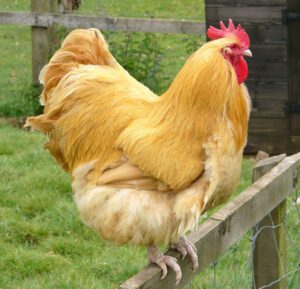
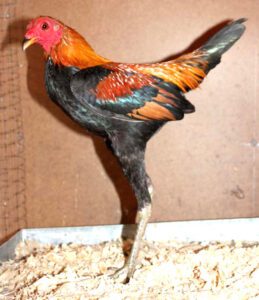
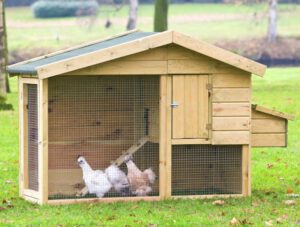
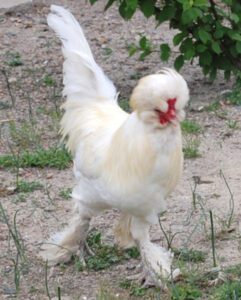
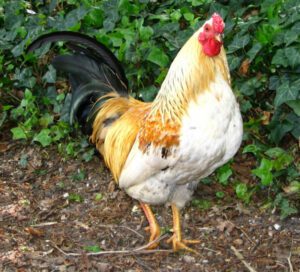
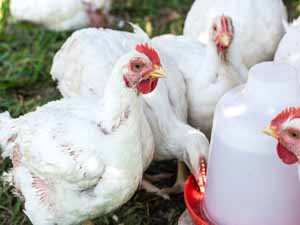
Thanks for the suggestions. I need a more secure coop and now I see where the small birds are coming in, just need to fix it.